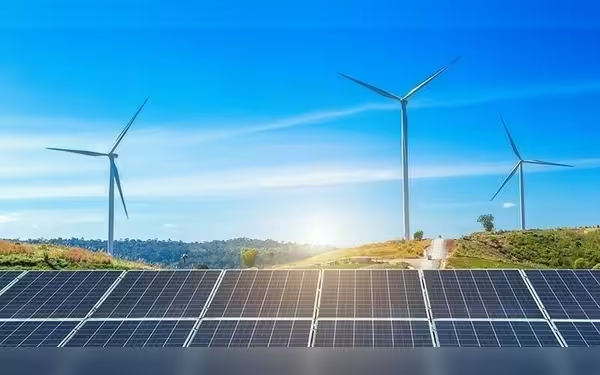Saturday, November 16, 2024 07:28 PM
Pakistan's Energy Future: Advocating for Nuclear Power Integration
- Experts emphasize nuclear energy for sustainable power solutions.
- High energy costs hinder industrial growth in Pakistan.
- A balanced energy mix is crucial for economic development.
 Image Credits: brecorder
Image Credits: brecorderExperts at a seminar advocate for nuclear power as a sustainable solution to Pakistan's energy crisis and economic challenges.
In recent years, Pakistan has faced significant challenges in its energy sector, grappling with power shortages and rising costs. The need for a sustainable and balanced energy mix has become increasingly urgent. At a seminar titled “Pakistan’s Energy Crisis: Role of Nuclear Power,” experts gathered to discuss the potential of nuclear energy as a viable solution to the country’s energy woes. Organized by the Centre for International Strategic Studies, the event highlighted the importance of integrating nuclear power into Pakistan's energy strategy.
Former chairman of the National Electric Power Regulatory Authority (Nepra), Tauseef H. Farooqi, shared his insights on the chaotic growth of the power sector in Pakistan. He candidly acknowledged the mistakes made by previous governments, stating, “We have damaged the country with ‘hard work’ as the power sector grew chaotically.” Farooqi emphasized the need for a structured approach, mentioning the introduction of the Indicative Generation Capacity Expansion Plan (IGCEP) and the Competitive Trading Bilateral Contract Market (CTBM) to enhance the electricity market.
During the seminar, Farooqi also discussed the role of nuclear energy, which is now recognized as a green energy source. He pointed out that while nuclear power requires high capital expenditure, it remains a cheap, reliable, and stable energy option. The government has committed to new projects totaling 17,000 MW by 2034, primarily focusing on hydropower, which does not provide a stable base load. This raises concerns about the sustainability of relying solely on hydropower.
Dr. Khaqan Najeeb, a former spokesperson for the Finance Ministry, addressed the economic barriers posed by high energy costs. He noted that these costs hinder industrial growth and are unaffordable for many middle-income consumers. Advocating for a competitive market structure, Dr. Najeeb suggested that retail competition could help lower prices and improve service quality. He highlighted the staggering capacity payments of approximately Rs 2.1 trillion and the financial burden of Rs 1.048 trillion in subsidies, calling for reforms to alleviate these pressures.
Dr. Najeeb proposed several measures, including reducing the Return on Equity (RoE) for government plants and re-profiling the debt of recent Independent Power Producers (IPPs). He indicated that agreements with five IPPs could potentially reduce costs by about Rs 0.65 per unit. Furthermore, he emphasized the need for introducing risk and reward mechanisms for the private sector, which could foster innovation and efficiency in energy production.
The seminar also featured keynote addresses from prominent figures, including Dr. Henri Paillere from the International Atomic Energy Agency (IAEA), who stressed that nuclear power is a long-term solution for sustainable energy. He quoted the International Energy Agency (IEA), stating, “Without nuclear, it is very hard to reach our target of emission and carbon-free energy.” This underscores the critical role that nuclear energy could play in Pakistan’s efforts to combat climate change.
As the discussions unfolded, it became clear that transitioning to nuclear energy is not just about meeting current demands but also about ensuring a sustainable future for Pakistan. Eminent politician and Senator Mushahid Hussain Syed, addressing the seminar as the chief guest, paid tribute to the scientists behind the country’s nuclear program. He emphasized the importance of shifting from fossil fuels to cleaner options, including nuclear power, to stimulate socio-economic growth.
The seminar highlighted a consensus among experts that a balanced energy mix, incorporating nuclear power, is essential for Pakistan’s energy security and economic development. As the country navigates its energy crisis, embracing nuclear energy could provide a pathway to a more sustainable and prosperous future. The discussions at this seminar serve as a crucial reminder that innovative solutions and collaborative efforts are needed to address the pressing energy challenges facing Pakistan today.













